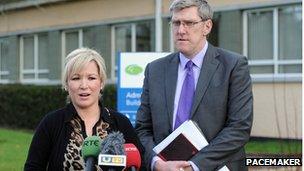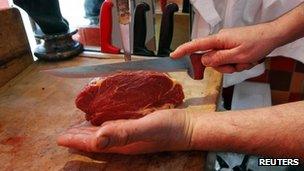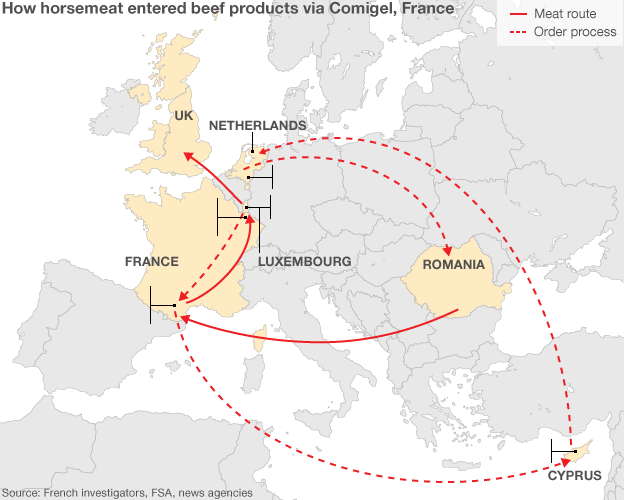Horsemeat scandal: Burgers withdrawn from hospitals
- Published

Agriculture Minister Michelle O'Neill and Education Minister John O'Dowd held a press conference about the issue.
Burgers containing horsemeat have been supplied to hospitals in Northern Ireland.
David Bingham from the Business Services Organisation, which sources meat for the health trusts, said that one range, supplied by a company in the Republic of Ireland was affected and had been withdrawn.
"We have acted immediately. As soon as we got information there may be a confidence issue we withdrew the product," he said.
Northern Ireland's agriculture minister, Michelle O'Neill, held a special meeting on the horsemeat scandal on Friday.
Education minister John O'Dowd attended the meeting.
Health minister Edwin Poots and justice minister David Ford were invited but did not attend.
Michelle O'Neill said: "I want to show leadership on this issue because it is so important we address the issue of public confidence. The other ministers who did not turn up will have to account for themselves," she said.
"The public are very concerned about it and we need to address the issue and show the leadership that people are expecting us to show."
On Thursday it emerged that as a precaution some education boards had withdrawn frozen burgers from schools for testing.

Investigations are continuing to find out how horsemeat found its way into beef products
Education Minister, John O'Dowd, said he was confident of the measures that were in place to assure food safety in schools.
"I am confident of our beef industry, I have confidence in our local suppliers and the vast majority of produce going into our schools is from local suppliers."
The ministers received an update from senior officials of the Foods Standards Agency (FSA) on their investigations into the controversy.
Meanwhile, UK-wide tests on the presence of horsemeat in processed meals have shown that 29 tests on food products found more than 1% horsemeat.
Of 2,501 tests conducted, 2,472 have come back negative, the Food Standards Agency says.
The Ulster Farmer's Union (UFU) has said it hopes revelations about the scandal are now all "out in the open".
UFU President Harry Sinclair said farmers want to see confidence rebuilt and that traceability standards have ensured Northern Ireland has avoided being drawn into the crisis.
"While the mood among farmers is still one of anger that the red meat sector has been dragged into this horsemeat scandal, there is also the need to press ahead and make a better food chain," he said.
"The benefits of a short supply chain and farm quality assured produce have been clearly demonstrated in this scandal and decisions should now be made by processors, retailers and government to make a much greater commitment to our local farm quality assured produce."
The UFU is to meet agri-food and retail bodies, also on Friday.
On Thursday, a company that makes burgers supplied to Northern Ireland schools that were recalled, said tests show they are clear of horse DNA.
Henderson Food Service had recalled the burgers after contacting one of its suppliers to seek assurances they were unaffected by the horsemeat scandal.
They were told the burgers were undergoing additional testing.
The supplier, Liffey Meats, has now said the tests show they are clear of horse DNA.
More than 9,000 burgers made for the UK market by a firm in the Republic of Ireland were also withdrawn after some were found to contain horsemeat.
Rangeland Foods in County Monaghan said that the burgers were made in September 2012 and used meat from Poland.
Some of the burgers, sold to the catering and wholesale sectors, contained between 5-30% horsemeat.
They had been distributed within Ireland as well as to five other European countries.
The company said they had contacted customers about the test results.
Meanwhile, one of those customers, catering company Compass, have confirmed that they have supplied burgers which contained horsemeat to two college in Ireland.
They have declined to name the colleges or confirm if they are located in Northern Ireland or the Republic of Ireland.
A spokesperson for Compass catering said the firm was supplied the burgers by Rangeland Foods.
 1. Comigel: Food processor
3. Spanghero: Meat processor
2. Tavola: Factory
4. Subcontractor
5. Trader
6. Abattoirs
7. Supermarkets
1. Comigel: Food processor
3. Spanghero: Meat processor
2. Tavola: Factory
4. Subcontractor
5. Trader
6. Abattoirs
7. Supermarkets
French food producer makes order
Comigel HQ in Metz, north-east France, asks its subsidiary, Tavola in Luxembourg, to make food products - including beef lasagne for Findus.
Factory orders meat
The Tavola factory orders the meat from Spanghero in the south of France.
Subcontractor used
Spanghero contacts a subcontractor in Cyprus to source the meat.
Subcontractor enlists trader
The Cypriot subcontractor in turn contacts a trader in the Netherlands.
Trader orders from Romania
The trader in the Netherlands places an order for meat with abattoirs in Romania.
Abattoirs send meat to France
The meat from the abattoirs travels to Spanghero in France. However, Romania rejects claims that it was responsible for wrongly describing the horsemeat from its abattoirs as beef. Horsemeat is always labelled as such, they say. The Romanian authorities claim records show orders had been for horse carcass - easily distinguishable from beef.
Meat used to make products
Spanghero sends the meat to the Comigel subsidiary’s factory in Luxembourg before the finished products are supplied to Findus and retailers across Europe, including the UK. The president of Comigel says the company was unaware the meat was coming from abroad.
Horsemeat found in Ireland and UK
Tests by Irish authorities have found equine DNA in beefburgers made by firms in the Irish Republic and the UK. Traces of horsemeat have also been found in stored meat at another plant in Ireland and one in Northern Ireland. In mainland Britain, police and officials probing alleged horsemeat mislabelling have carried out raids at a slaughterhouse in West Yorkshire and a meat firm near Aberystwyth. Three men were later arrested on suspicion of offences under the Fraud Act..